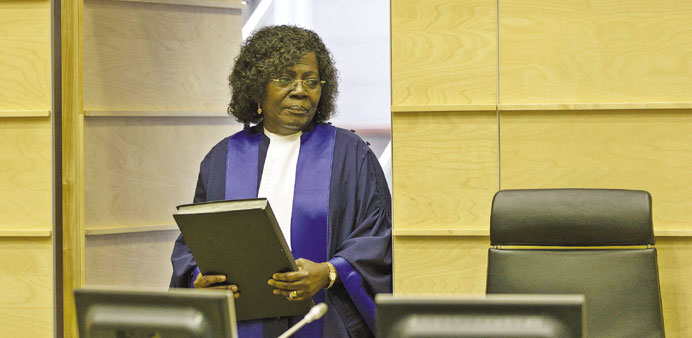Appeals Judge Akua Kuenyehia of Ghana arrives to preside over the case of The Prosecutor v Abdullah al-Senussi of Libya in the courtroom of the International Criminal Court at The Hague.
The International Criminal Court (ICC) yesterday confirmed that Libya could try Gaddafi-era intelligence chief Abdullah al-Senussi, rejecting an appeal against its prior decision not to bring him to trial in The Hague.
The court’s appeals chamber upheld an October 2013 ruling which said that Libya was “willing and genuinely able” to investigate crimes against humanity allegedly committed by the aide of long-time ruler Muammar Gaddafi.
In 2011, the ICC charged al-Senussi with crimes against humanity for his role in suppressing a 2011 revolt that ended Gaddafi’s rule.
Libyan authorities began hearings in the case in April, with al-Senussi going on trial alongside Gaddafi’s sons Saif al-Islam and Saadi.
Saif al-Islam Gaddafi has been at the centre of a tug of war between Libya and the international court based in The Hague, which says it has the prior right to try him.
Human Rights Watch criticized the ruling, charging that Libya has done little to provide Sanussi with basic due process rights.
“As the country enters another month of chaos, where judges, lawyers and prosecutors are being killed, it’s hard to imagine that Libya can hold any fair trial, much less a trial of this sensitivity and significance,” the New York-based group’s international justice director, Richard Dicker, said.
Libya’s two main cities, Tripoli and Benghazi, are both suffering from persistent deadly clashes between rival militias and military units, spurred on by interlocking local rivalries and struggles between Islamists and their opponents.
Many Libyans are now placing their remaining hopes for stability upon the recently elected parliament, which is due to take over from the ineffective and Islamist-dominated General National Congress on August 4.
Libya’s rulers have struggled to impose order since Gaddafi’s 2011 ouster, with the country paralysed by political infighting and the proliferation of heavily armed militias.

